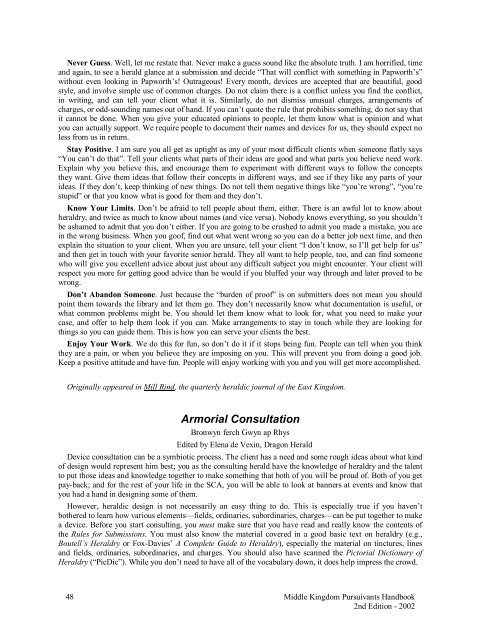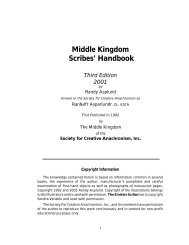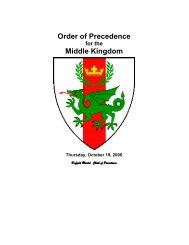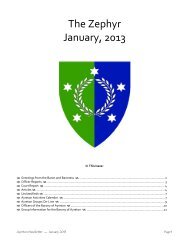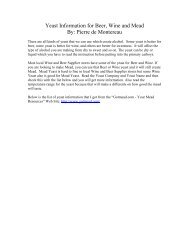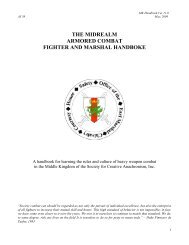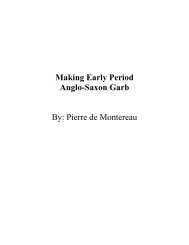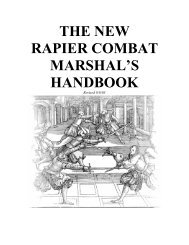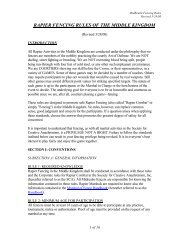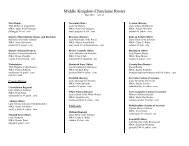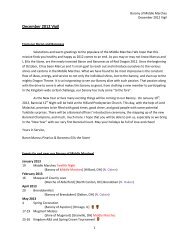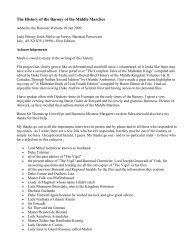Never Guess. Well, let me restate that. Never make a guess sound like the absolute truth. I am horrified, timeand again, to see a herald glance at a submission and decide “That will conflict with something in Papworth’s”without even looking in Papworth’s! Outrageous! Every month, devices are accepted that are beautiful, goodstyle, and involve simple use of common charges. Do not claim there is a conflict unless you find the conflict,in writing, and can tell your client what it is. Similarly, do not dismiss unusual charges, arrangements ofcharges, or odd-sounding names out of hand. If you can’t quote the rule that prohibits something, do not say thatit cannot be done. When you give your educated opinions to people, let them know what is opinion and whatyou can actually support. We require people to document their names and devices for us, they should expect noless from us in return.Stay Positive. I am sure you all get as uptight as any of your most difficult clients when someone flatly says“You can’t do that”. Tell your clients what parts of their ideas are good and what parts you believe need work.Explain why you believe this, and encourage them to experiment with different ways to follow the conceptsthey want. Give them ideas that follow their concepts in different ways, and see if they like any parts of yourideas. If they don’t, keep thinking of new things. Do not tell them negative things like “you’re wrong”, “you’restupid” or that you know what is good for them and they don’t.Know Your Limits. Don’t be afraid to tell people about them, either. There is an awful lot to know aboutheraldry, and twice as much to know about names (and vice versa). Nobody knows everything, so you shouldn’tbe ashamed to admit that you don’t either. If you are going to be crushed to admit you made a mistake, you arein the wrong business. When you goof, find out what went wrong so you can do a better job next time, and thenexplain the situation to your client. When you are unsure, tell your client “I don’t know, so I’ll get help for us”and then get in touch with your favorite senior herald. They all want to help people, too, and can find someonewho will give you excellent advice about just about any difficult subject you might encounter. Your client willrespect you more for getting good advice than he would if you bluffed your way through and later proved to bewrong.Don’t Abandon Someone. Just because the “burden of proof” is on submitters does not mean you shouldpoint them towards the library and let them go. They don’t necessarily know what documentation is useful, orwhat common problems might be. You should let them know what to look for, what you need to make yourcase, and offer to help them look if you can. Make arrangements to stay in touch while they are looking forthings so you can guide them. This is how you can serve your clients the best.Enjoy Your Work. We do this for fun, so don’t do it if it stops being fun. People can tell when you thinkthey are a pain, or when you believe they are imposing on you. This will prevent you from doing a good job.Keep a positive attitude and have fun. People will enjoy working with you and you will get more accomplished.Originally appeared in Mill Rind, the quarterly heraldic journal of the East <strong>Kingdom</strong>.Armorial ConsultationBronwyn ferch Gwyn ap RhysEdited by Elena de Vexin, Dragon HeraldDevice consultation can be a symbiotic process. The client has a need and some rough ideas about what kindof design would represent him best; you as the consulting herald have the knowledge of heraldry and the talentto put those ideas and knowledge together to make something that both of you will be proud of. Both of you getpay-back; and for the rest of your life in the SCA, you will be able to look at banners at events and know thatyou had a hand in designing some of them.However, heraldic design is not necessarily an easy thing to do. This is especially true if you haven’tbothered to learn how various elements—fields, ordinaries, subordinaries, charges—can be put together to makea device. Before you start consulting, you must make sure that you have read and really know the contents ofthe Rules for Submissions. You must also know the material covered in a good basic text on heraldry (e.g.,Boutell’s Heraldry or Fox-Davies’ A Complete Guide to Heraldry), especially the material on tinctures, linesand fields, ordinaries, subordinaries, and charges. You should also have scanned the Pictorial Dictionary ofHeraldry (“PicDic”). While you don’t need to have all of the vocabulary down, it does help impress the crowd.48 <strong>Middle</strong> <strong>Kingdom</strong> <strong>Pursuivants</strong> <strong>Handbook</strong><strong>2nd</strong> <strong>Edition</strong> - 2002
A good consultant will have these elements memorized. Oh, you don’t have to necessarily know the name foreach charge, but you do need to know all the permutations of field division, and names and patterns for all thecommonly used furs. You also need to know (and have practiced!) how these elements can be combined into agood, simple, clean device that is authentic in composition and pleasing to the eye.Tools of the TradeThere are certain tools you will have to have with you when you are consulting:Books:Pictorial Dictionary of Heraldry (“PicDic”)Rules for SubmissionsFriar’s A Dictionary of HeraldryorParker’s A Glossary of Terms Used in HeraldryTools:Sketch escutcheons, roundels and lozenges(see Appendix for copies of all forms)Pencils and a good eraserRuler (a protractor with a 6-inch ruler will do nicely)Colored markers (Crayola makes a good basic set with all the heraldic colors)The Consultation & Design ProcessYou have probably heard over and over that simple heraldry is impossible to get through the College ofArms. You may be surprised, then, to know that just the opposite is true: simple, elegant heraldry is veryprobably still the easiest sort to get passed! It is also certainly the easiest to check for conflict, and the easiest toalter in those cases where conflict is found to occur.Unless you are very experienced and think very fast, you will need to have about 30 minutes to an hour foryour first meeting with your client. When you first sit down with him, remind the client that arms are not likeclothing—they can’t be changed at the blink of an eye; that they are something that he will, in all likelihood,have for many years; that they are something to be proud of. Begin by telling him not to worry about correctblazonry when talking about what he wants, that the picture is paramount at this point and the pretty words cancome later. Have him tell you about any ideas that he might have already had for a device and ask him to sketchit (or you sketch it as he tells you about it). Ask him about things that have special meaning for him—hisfavorite colors, favorite/totem animals, plants, a craft or skill in which he is interested, possibly even a proverbor saying that has special meaning. Ask him what kind of first impression he would like to put forth; what hewould like the world to know first about himself. Does he want to show a sense of humor? (Think ‘canting’)Does he want to project a quality—gallantry? bravery? spirituality? love (or love lost)? As he mentions eachitem, write it down at the top of your sketch sheet. After he has finished, hand him the list and ask him toprioritize it.Now is the time when all the hard work you have put in learning heraldry will come to fruition. Circle theitems with the highest priority and suggest that you can begin the process by playing with those. If one of thepriorities is an animal (as it is very often), discuss the various attitudes and attributes. Does he want to show hisbeast salient? dormant? If a bird, should it be rising or displayed? Should it be facing dexter or sinister? Perhapsthe client has already decided that he wants only a leg or a head; or perhaps he wants a maintained tertiarycharge. Talk about proper (remember the Rule of Contrast—a brown bear on a black field will get bumped, aswill a yellow canary on white). Remember that inanimate objects look best when displayed upright along a lineof division (although an anvil palewise still looks rather strange to my eye). Also remember that only overt,overly religious designs are forbidden—there’s nothing wrong with someone including one cross or one crownof thorns or a bundle of mistletoe. And while it may be difficult to pass a device with a unicorn on it, it’s notimpossible (and using a dragon really is permissible in the <strong>Midrealm</strong>!).<strong>Middle</strong> <strong>Kingdom</strong> <strong>Pursuivants</strong> <strong>Handbook</strong> 49<strong>2nd</strong> <strong>Edition</strong> - 2002
- Page 2:
Middle Kingdom Pursuivants Handbook
- Page 5 and 6:
INTRODUCTION.......................
- Page 7 and 8:
Saracens: Early to Mid-Medieval Mus
- Page 9 and 10: IntroductionOsric of FayrehopeWhat
- Page 11 and 12: AcknowledgementsMistress Elena de V
- Page 13 and 14: The Middle KingdomCollege of Herald
- Page 15 and 16: Regional HeraldsConstellation Heral
- Page 17 and 18: Pursuivant DutiesDuties of the Bran
- Page 19 and 20: All submissions should be sent to t
- Page 21 and 22: What to Report?First of all, your r
- Page 23 and 24: esponsibility now. It wouldn’t hu
- Page 25 and 26: simply too pervasive. Chilly weathe
- Page 27 and 28: switched into the losers’ bracket
- Page 29 and 30: prevent accusations of a rigged lis
- Page 31 and 32: the green fabric), a larger spool o
- Page 33 and 34: Precedence and CourtesyCourtly Beha
- Page 35 and 36: Territorial Barons and Baronesses m
- Page 37 and 38: c. Once all presentations appear to
- Page 39 and 40: i. Oaths of Fealty and Acknowledgem
- Page 41 and 42: herald is the voice of the Crown an
- Page 43 and 44: Award of the Dragon's FlightOP Abbr
- Page 45 and 46: Award of ArmsOP Abbreviation - AoAL
- Page 47 and 48: Order of the Red CompanyOP Abbrevia
- Page 49 and 50: Order of the WillowOP Abbreviation
- Page 51 and 52: Order of the Gold MaceOP Abbreviati
- Page 53 and 54: Master of ArmsOP Abbreviation - MSC
- Page 55 and 56: Prince and Princess of NorthshieldO
- Page 57 and 58: - The Consort of Northshield bears
- Page 59: The Submission ProcessWorking with
- Page 63 and 64: submit it anyway (“I may be wrong
- Page 65 and 66: Internal Letter Of Acceptance And R
- Page 67 and 68: NamesOn Names and Name Documentatio
- Page 69 and 70: Choosing a CultureJehan de la March
- Page 71 and 72: Clothing: For the Slavic groups, pr
- Page 73 and 74: Politics: The entire Islamic world
- Page 75 and 76: Although in the earlier Middle Ages
- Page 77 and 78: character in Household’s Arabesqu
- Page 79 and 80: An Extremely Brief BibliographyWest
- Page 81 and 82: ArmoryThe Philosophical Roots of He
- Page 83 and 84: Even if your natural instinct for a
- Page 85 and 86: 5. Peripheral secondary charges.6.
- Page 87 and 88: Brisures (marks of cadency) and aug
- Page 89 and 90: Still found in mundane blazons are
- Page 91 and 92: Efficient Conflict ResearchKeridwen
- Page 93 and 94: 1. Is there a peripheral charge (a
- Page 95 and 96: checking under the old rules, the s
- Page 97 and 98: 2. Yes, the peripheral is charged.
- Page 99 and 100: Many authors state that dancetty is
- Page 101 and 102: Charges may be placed on either sid
- Page 103 and 104: It’s a bit more complicated to ke
- Page 105 and 106: This page shows properly drawn exam
- Page 107 and 108: This page shows a number of common
- Page 109 and 110: Postures of Animals (cont’d)Posit
- Page 111 and 112:
Postures of BirdsPosition & Comment
- Page 113 and 114:
Postures of Fish and DolphinsPositi
- Page 115 and 116:
Barony of Caer Anterth MawrAzure, a
- Page 117 and 118:
Barony of the North WoodsAzure, a w
- Page 119 and 120:
Shire of AfonlynAzure, on a bend ar
- Page 121 and 122:
Shire of Rivenwood TowerErmine, on
- Page 123 and 124:
Reference BooksThe Basic HeraldBron
- Page 125 and 126:
Bardsley, Charles Wareing. English
- Page 127 and 128:
Kaganoff, Benzion C. A Dictionary o
- Page 129 and 130:
Sims, Clifford Stanley. The Origin
- Page 131 and 132:
Moncreiffe, Iain, and Don Pottinger
- Page 133 and 134:
Bruce Draconarius of Mistholme and
- Page 135 and 136:
Rules and RegulationsRules for Subm
- Page 137 and 138:
Although China, Random and Starhawk
- Page 139 and 140:
iii. Heraldic Titles - Heraldic tit
- Page 141 and 142:
ii. Number of Name Phrases - A pers
- Page 143 and 144:
PART VII - COMPATIBLE ARMORIAL CONT
- Page 145 and 146:
i. A metal and a color;ii. An eleme
- Page 147 and 148:
PART IX - OFFENSIVE ARMORYOffensive
- Page 149 and 150:
ii. Field-Primary Armory - If neith
- Page 151 and 152:
j. Changes to Charges on Charges -
- Page 153 and 154:
3. Marshalling. - Armory that appea
- Page 155 and 156:
directly by individuals, but may be
- Page 157 and 158:
the Laurel Office from the registra
- Page 159 and 160:
charge or augmentation is transferr
- Page 161 and 162:
so that ð is alphabetized as dh,
- Page 163 and 164:
1. Failure to Comment. Failure to c
- Page 165 and 166:
B. Content of Letters of Acceptance
- Page 167 and 168:
1. Principal Heralds - The Principa
- Page 169 and 170:
1. Financial Reports - Financial re
- Page 171 and 172:
Appendix B - Standard Designations
- Page 173 and 174:
Appendix D - Suggested Standard For
- Page 175 and 176:
Appendix G - Role of the Deputy Sov
- Page 177 and 178:
Glossary of TermsThis glossary was
- Page 179 and 180:
Complement, In Her*—Describes the
- Page 181 and 182:
Fur—Some furs, like Vair, Potent
- Page 183 and 184:
Mon—Japanese armorial insignia†
- Page 185 and 186:
Registration—Acceptance by Laurel
- Page 187 and 188:
AppendicesSources for Heraldic Publ
- Page 189 and 190:
• Send the four copies in and kee
- Page 191 and 192:
“Major” or “minor” changes?
- Page 193 and 194:
See the General section at the begi


